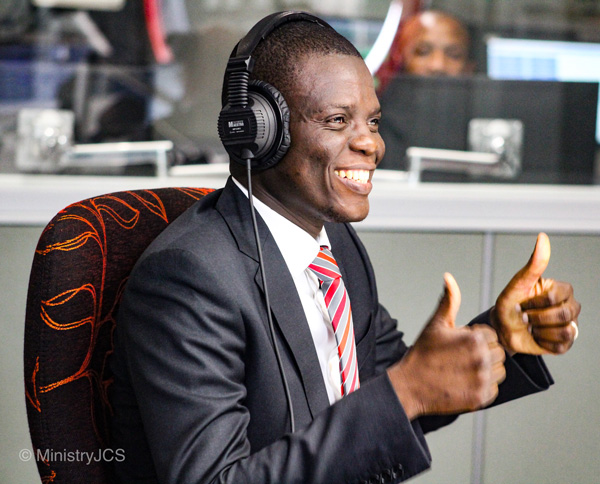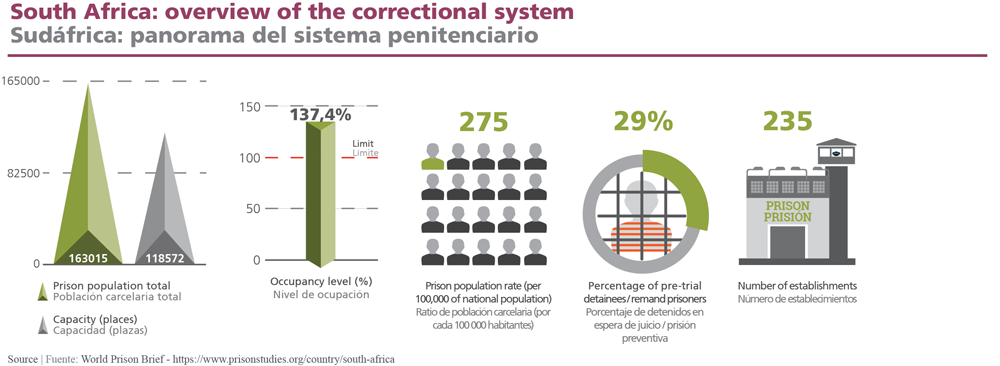// Interview: Ronald Lamola
Minister of Justice and Correctional Services, South Africa
JT: You have recently been appointed as Minister both of Justice and Correctional Services. How do you see this role?
RL: Since being appointed as Minister of Justice and Correctional Services, I came to appreciate the importance of integrating the two departments. Correcting offenders is a non-negotiable element of justice in South Africa’s Constitutional democracy. In many ways, this integration lies at the core of delivering a Criminal Justice System which is well-coordinated and effective. It is with the aid of dedicated prosecutors and committed correctional services officials that we can strike the constitutional balance between the pursuit of justice without undermining the dignity of the people who are found to have offended the Boni mores of our communities.
JT: What approach and efforts have been made to strengthen the effectiveness of the South African Criminal Justice System?
RL: South Africa’s justice system is an integral part of the country’s reconstruction from a state which was designed from a legislative perspective to cater for a few and disempower the majority. Inevitably, this reconstruction is not without challenges, in parts, the reconstruction entails repealing discriminatory laws and legislating inclusive laws. As such, ensuring that our justice system works is a transformative process.
An increased focus has been placed in accordance with the Presidential directives on gender-based crimes and sexual offences matters. The courts continue to put special emphasis on the conviction of sexual offences matters. The improved conviction rate in sexual offences during the 2018/19 financial year of 74,4% reflects a firm commitment to deliver justice for the victims of sexual offences and gender-based violence. A conviction rate of 73,5%, with 1,636 convictions, was recorded with assistance from Thuthuzela Care Centres, which are dedicated centres where sexual crimes are reported. Notwithstanding these results, we acknowledge that much improvement can still be made in the protection, defence and support of the most vulnerable, including addressing the scourge of femicide. Small Claims Courts continue to improve access to justice and make civil justice inexpensive, less formal and accessible to those who cannot afford litigation in the ordinary civil courts.
Legal Aid South Africa continues to champion the rights of all persons to access justice through the provision of independent, accessible and quality legal aid services in criminal and civil legal matters. In partnership with the Foundation for Human Rights, our socio-economic Justice (SEJA) Programme aims to facilitate the realisation of socio-economic rights for vulnerable and marginalised groups and the strengthening of civil society organisations in the social justice sector.
(...) I came to appreciate the importance of integrating the two departments. Correcting offenders is a non-negotiable element of justice in South Africa’s Constitutional democracy.
JT: What are the main challenges faced by the current correctional system?
RL: Our constitutional democracy sits with human dignity as a basic tenant. In other words, Ubuntu/botho (humanity), is central even in the pursuit of justice. In one of the matters that were presided by the Constitutional Court of the country in the year 2006, during Dikoko v Mokhatla, Justice Sachs when delivering judgment elevated ubuntu as an international standard of restorative justice. “Ubuntu/botho (humanity) is highly consonant with rapidly evolving international notions of restorative justice. Deeply rooted in our society, it links up with world-wide striving to develop restorative systems of justice based on reparative rather than purely punitive principles. The key elements of restorative justice have been identified as encounter, reparation, reintegration and participation.” In essence, what we should be able to illustrate in our 25th year of democracy is that our correctional facilities are capable of reintegrating offenders back into the community. To achieve this constitutional ideal, our processes must be based on mutual respect for and mutual commitment to one another. It is for this reason that we have shifted from the notion of prisons to correctional facilities. This is not a cosmetic shift; it is a paradigm shift. In a constitutional society, we need not merely keep individuals out of circulation or bluntly enforce punishment meted out by the courts. We have an acute responsibility to correct the offending behaviour, in a secure, safe and humane environment and effect maximum rehabilitation and far as possible avoid recidivism.
Rehabilitation should be seen as a societal undertaking which incorporates and encourages social responsibility, social justice, inculcation of democratic values and empowering our communities with life skills to enable members of society to make South Africa a better place to live in. As the Minister, I am busy analysing the rehabilitative programmes we have at our disposal. In line with the new mantra of the sixth administration, partnerships with the private sector and communities are essential to ensure that our facilities function to the benefit of society. There is an important question which I have sought to understand from a perceptual level and at the level of reality, “Who are South Africa’s offenders?”. It is an uncontested fact that our facilities are over-crowded, and this does hamper security and rehabilitative programs.
In the past couple of months, I have visited several correctional facilities through announced and unannounced visits and will continue to do so. A clear image crystallised itself since these visits: the impact of South Africa’s violent history is still with us today. The high levels of violence we see in our communities especially those which bore the brunt of colonisation cannot be delinked to the high levels of criminal activities we see today. Violence has become the default process for conflict resolution in society especially domestic conflicts. Added to that is the impact of the deliberate underdevelopment of African communities, inequality and poverty which create conducive grounds for increases in crime, the growth of criminal syndicates and gangs. This is also compounded by the historic and systematic marginalisation of youth and the inability of the economy to absorb youth into the job market.
It is also evident that gender inequality, which manifests itself in the form of power relations between men and women and patriarchal beliefs, contribute to high levels of violence perpetrated against women. Our criminal justice system needs to respond more substantively to victims of crime; the incarceration of individuals who come from these floored communities is just but one facet of restoring the balance in our society. The other side of the coin reveals that our facilities are filled with women who have retaliated to the violence meted out by their partners. Women and youth who have resorted to shoplifting as a means of survival. Young men serving jail term because they cannot afford bail.
It is for this reason that we have shifted from the notion of prisons to correctional facilities. This is not a cosmetic shift; it is a paradigm shift.
JT: Offenders in Community Corrections constituted less than half of the prison population in 2018/2019, and there were just over 70,500 probationers and parolees.[1] To what extent would the correctional system benefit from having more offenders under supervision in the community instead of incarcerated? What do you consider to be the challenges in the area of non-custodial sentences?
RL: Parole gives effect to the principle of social reintegration of the offender as part of the purpose of the Correctional System. It also recognises the fact that the parolee is particularly vulnerable at the beginning of the process of social reintegration. It must be emphasised that parole takes place under the guidance of correctional officials based in the community, and under conditions determined by the Parole Board based on the assessment of the parolee. Ultimately, we want a correctional system that is capable of enforcing the sentences imposed by the courts. To this end, our parole policy must always be aligned with the sentencing policy and the reason for the imposition of the particular sentence by the court of law. The parole policy should also make provision for any possible change on the part of the parolee that may reduce or remove the risk that the individual poses to society.
Our key objective must be to make a meaningful contribution to the promotion of the community’s responsibility for correction. To this end we must educate the society about the provisions available that involve participation by members of the community, employees from relevant state departments in the integrated justice system, and family and friends of the inmate, in the processes of community supervision and parole boards. Inmates themselves also have the right to make representations to the Board, as does the victim of the criminal act. What we want to achieve in the Correctional Services is to make sure that when offenders are released, they have gone through programmes that will enable them to use their skills to make a living outside our facilities and contribute to economic growth of their communities. We appeal to all South Africans to give offenders a second chance and not discriminate against them as by doing that, offenders will unfortunately go back to their criminal activities. Let society support offenders who are released as they have gone through various programmes that have equipped them with ways of contributing to society.
We have examples of offenders who are operating successful businesses after acquiring skills at our correctional facilities and this is an area that we want to enhance so that offenders who leave our facilities, leave with skills that will enable them to abandon their criminal ways. We are encouraging offenders upon their release to initiate projects using skills that they acquired, and we have examples of such projects which include a female parolees project who are doing a Knitting Project that we regularly display during exhibitions of the department. The project made donations to homes of abandoned children and gave beanies and scarfs to old age Centres. The project continually recruits released female offenders to join them and this is the kind of project that we want in order to have footprints in all provinces of the country.
We also have parolees like Mhambi Mtose, who was sentenced to two life sentences in 2000. He is currently running a butchery business, and also sells food at a taxi rank daily. He has acquired two vehicles, and four deep freezers. Whilst in custody, he received skills training in carpentry and other areas, and was also Head Chef at Drakenstein Correctional Centre. He was admitted into the system of community corrections in 2017, and the skills he acquired in terms of the preparation of food, whilst in custody, has now placed him in good stead to have his own stake in the food industry. Mtose has also employed three people permanently and other offenders should follow his example, as this is what we want them to do upon their release.
Yet another parolee, Victor Rampeng, was sentenced to 16 years’ imprisonment in 1996. Whilst incarcerated, he completed his matric and thereafter his BCom Degree in Retail Management. He is currently busy with his Honours Degree in Business Management. In 2016, Rampeng registered his company known as Resinalo Development Projects Pty Ltd, which carries out projects in welding, fencing, building, renovation, paving and so on. He currently has 15 employees in his business. These are some of the parolees that I have interacted with and I constantly encourage them to grow their business.
We are continually going to prioritise education of offenders in all our centres. Last year, our Grade 12 offenders achieved a 77.3 % pass rate and we are looking at improving this. 36.22% of these offenders qualified for admission to bachelor’s degree studies at universities while 24.85% offenders were eligible to obtain a national diploma, and 16,22% offenders were eligible to enrol for higher certificate courses. Offenders achieved a total of 56 distinctions in various subjects in their exams and we hope they will improve this year.
Our plan is to continue to align the training programme of offenders with the United Nations Office on Drugs and Crime (UNODC) Roadmap for the Development of Prison-based Rehabilitation Programmes as well as the United Nations Special Rapporteur on the Right to Education which affirm our programme that learning in prison has a positive impact on recidivism, reintegration and employment outcomes.
We are also continuing with the Victim-Offender Dialogues (VODs) initiative which is aimed at strengthening the current rehabilitation and reintegration programmes. We want to keep as many people as possible away from incarceration through reconstruction of family units and community systems as well as victim support and empowerment, while pursuing the rehabilitation of those already incarcerated through well-managed rehabilitation programmes. We are confident that these majors will enhance our efforts of achieving our target of 97% of parolees without violation per year and a further 97% of probationers without violation per year. We cannot achieve this without the deepened involvement of communities, and we encourage their participation and support. However, it is very important that our well-intentioned rehabilitative programmes do not create the impression that incarceration provides for an alternative society that is even better than life outside correctional facilities. There have been misconceptions that our correctional facilities offer luxurious lives to offenders and we want to reiterate to society that such is not true and there is no element of luxury in any of our facilities. Even though offenders are humanely incarcerated, they are made to live with only basics and their conditions are far from luxury.


JT: How do Correctional Services address the challenges posed by gangs and organised crime factions in prisons?
RL: One of the important tasks that we want to achieve in correctional services is to eliminate corruption and smuggling of contrabands and we are continually working hard to eliminate this through raids and we will use technology to detect and prevent smuggling of contrabands. All officials who engage in acts of corruption must know that they do not belong with the department and we will punish them accordingly and will show them no mercy. Our centres must remain centres to rehabilitate offenders, and any behaviour that is not consistent with that will not be accommodated in any way.
We are open to the realities that we need to be effective, but for this to happen, we need to get the basics right. It means creating correctional centres that are safe, where rehabilitation is purposefully structured to transform lives. We are confident that by working with our people, we will turn things around and rehabilitate offenders so that they abandon their criminal life and be good citizens who will contribute towards building our country.
JT: What is your Ministry’s view on the future of the PPP model in South Africa’s correctional services?
RL: South Africa has two privately run correctional facilities where private companies are responsible for security and provision of proper accommodation, medical treatment, nutrition, and recreational and rehabilitation programmes. Offenders at these two centres receive the same privileges as those elsewhere in the country.
[1] Annual Report 2018/2019, Department of Correctional Services, Republic of South Africa
//
Ronald Lamola has been the Minister of Justice and Correctional Services of the Republic of South Africa since May 2019. He has an extensive academic background in Law including two master’s degrees at the University of Pretoria – one in Corporate Law and one in Extractive Law in Africa – and an LLM in Corporate Law. He is the former Deputy President of the African National Congress Youth League where he sits in the National Executive Committee (since December 2017) and the National Working Committee. He was the acting spokesperson for the Premier of Mpumalanga from January to October 2011, and previously was Transversal Unit Manager at the Govan Mbeki Municipality, in 2009.



